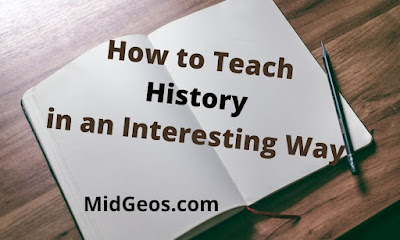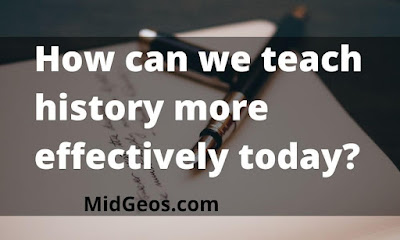Hooray! You're here in this climate where teaching history in classrooms or at home has not become redundant.
Teaching your children about the past is one of the most important things you can do for them. It builds empathy, gives them perspective, and helps hone their analytical skills.
History teaches us about culture, human rights, how our lives are shaped by innovation and so much more. So when it's taught effectively, it's an amazing journey for everyone involved.
 |
| How to Teach History in an Interesting Way |
But how can you teach history when so much of it is socially constructed, rooted in someone’s perspective or interpretation? Simply put: by showing students that history isn't just what happened-history is what we say happened. And your perspective matters because your perspective shapes history.
How to Teach History
First off, let's define history-especially in the context of education
How to teach history in 2022: A teacher's guide - FutureLearn
History is an extremely important subject for many reasons. Here is a guide for current or prospective teachers who want to teach history in a meaningful and appropriate way.
History studies as a kid may or may not have left a positive impression on you. While some individuals may recall the sense of wonder and fascination engendered by learning about the past, others may recall feeling unrepresented.
Whatever your background, the importance of knowing about history cannot be overstated. History is still a part of most school curricula today, and this is unlikely to change. The manner we teach it, on the other hand, will alter.
In this article, we’ll be discussing why history is so important and some of the current challenges in the UK history curriculum. We'll then look at how history may be taught in a way that keeps up with changes in the globe and culture, so that we can portray a full picture of our past. Finally, we'll discuss how to become an effective history teacher.
Why is history an important part of the curriculum?
There are several reasons why history is important to teach children, as well as why we should continue to study about history as adults. This is due to the fact that history cannot be "finished" or "ticked off" during your school years.
There are several histories to investigate and comprehend, ranging from the histories of various countries and civilizations to political movements. Learning about these many histories should be a lifetime endeavor that will help you better understand yourself and the world around you.
By looking at the past, we can try to understand why things are the way they are, and process how society has changed over time. We are significantly more likely to be compassionate to other people's suffering and capable of confronting societal problems if we comprehend context.
This is because history teaches us political acumen, morals, personal development, and how to learn from our failures. Learning history helps us develop reading and writing abilities, as well as the ability to design our own perspectives, research skills, and the ability to analyze circumstances and sources on a more academic level.
How can we teach history more effectively today?
Now that we have a better understanding of some of the current issues with the UK history curriculum, how can we begin to teach history more effectively in 2021? In the University of Bristol’s open step about perspectives on decolonisation, Professor Olivette Otele discusses the idea that we need to first understand how practices of teaching and learning have led to “a curriculum that is colonial in essence”.
 |
How can we teach history more effectively today? |
She suggests that we must critique and dismantle our current practices and curriculum so that we understand the history and mechanisms behind them, and then we can introduce material that is more relevant to the global community today. Relevant material might include the history of a diverse range of cultures in the UK, the true history of the British Empire in different countries, histories of migrations to the UK, and narratives of people excluded from history books.
In the University of Bristol’s open step about reparative histories, experts suggest that a reparative history of race could be a good approach for teachers, scholars and researchers. This is a similar perspective to decolonising the curriculum, as it focuses on “reassessing the origins and development of racism in society and its legacies in the present”.
In the open step, experts argue that taking this approach requires us to acknowledge that racism is systemic and reproduced in institutions like schools and universities. They, therefore, suggest that teachers and scholars need to strive to decentre whiteness as the default for the history of humanity. When teaching and learning about history, we should always ask questions, critique sources, and look for alternative narratives. Only then will we be able to learn from the past.
Read Also:
The history of Minoan: the rise and fall of the Minoan civilisation
How can I become a history teacher?
If you’re interested in becoming a history teacher, you will find plenty of resources that will help you prepare. Our blog about deciding what kind of teacher to be gives you the lowdown on teaching all different ages, and will hopefully help you decide what suits you.
Failure to recognize the role of colonialism
Another complaint against the curriculum in England is that it does not give a detailed account of the British Empire. The guidelines state that pupils should learn about the importance of ideas, political power, industry and empire in Britain between 1745 and 1901.
However, there is a vague suggestion that this could include exploring the role of the British Empire. But it is also acceptable to teach about the British Empire’s accomplishments, such as the Industrial Revolution. In fact, these two areas are sometimes even taught separately. So, it seems like a missed opportunity to educate children on the empire without teaching them anything about its challenges or failures.
If you want to learn more about British imperialism, you can try our Empire: the Controversies of British Imperialism course explores the British Empire through six themes – money, violence, gender, race, religion, propaganda.
In an article in the New Statesman, John Elledge discusses how he and most people he knows in the UK were not taught about the British empire, and the few that were only got taught during GCSE or A-level history, which are not mandatory. Since the British empire is a fundamental part of our history, it seems strange to skim over it in this way.
However, although this might include exploring how Britain colonised other parts of the world, it is just as acceptable for schools to teach about the accomplishments of the British Empire, such as the Industrial Revolution. This lack of specificity in the national curriculum leaves room for choice and interpretation that might prevent children from receiving a more well-rounded education of the British empire.
Another criticism of the UK history curriculum is that it fails to fully recognize or teach Britain’s role in colonialism. As you can see from the curriculum guidelines, the government states that pupils should be taught about ideas, political power, industry and empire in Britain between 1745 and 1901.
Should you teach history as a general subject?
We think so. It’s one of the most important skills we can teach our children and one that can have a significant impact on their future.
As educators, we need to ask ourselves if our teaching practices are contributing to the creation of the future, or are they leaving our students to learn history in a vacuum.
Teaching history should not be a burden. It should be fun and interesting, especially for those of us who enjoy history, and if you do, then you’ll understand what we mean.
What is the best way to teach history?
As we’ve discussed, we think history is one of the most important subjects we can teach. It’s a subject that can have a huge impact on our future.
In fact, a lot of people who have grown up learning history are the ones who are now teaching history in the classroom. We think it’s important to encourage people to teach history because of how important it is to the development of our future.
We’ve also discussed how we think the curriculum needs to change. But there’s more to it than that.
How do you differentiate between teaching history and teaching history as a discipline?
We think the curriculum has failed to provide our children with a foundation of knowledge and understanding.
If you want to teach history, you need to teach history, but you also need to teach history as a discipline.
We think the curriculum has failed to provide our children with a foundation of knowledge and understanding.
You need to ask yourself, ‘How do I teach history?’ We’ve done some research and identified some of the questions you need to ask yourself when teaching history.
How can you make history more interesting?
To be a university lecturer, you’ll need either an upper second or first class degree qualification in your chosen field, a masters or PhD in that field, and potentially to be publishing academic work. You are also normally expected to do a teaching qualification as you work in your lecturing role.
What qualifications do I need?
To become a teacher, you need to either have a degree in education or in another subject. If you don’t have a degree, you can still apply to be a teacher.
You can become an A-Level teacher without a teaching qualification, but you may be expected to study for one by some institutions. In addition, you’ll probably increase your chances of finding a job if you have a teaching qualification. Alternatively, you can complete a PGCE.
To teach at A-Level, you will be expected to already hold a minimum of a Level 3 qualification in the subject area you wish to teach, although employers are free to set their own entry requirements.
To be a primary or secondary school teacher, you either need a degree in education, or a degree in something unrelated (like history) and an additional teaching qualification like a QTS or PGCE.
Final thoughts
We hope that this article has provided you with some information about the shortcomings of the UK history curriculum and demonstrated what history lessons have the capacity to look like in 2022. Of course, it’s a complicated topic, but ultimately, we want children to grow up learning about history in a fun, inclusive and exploratory way.
